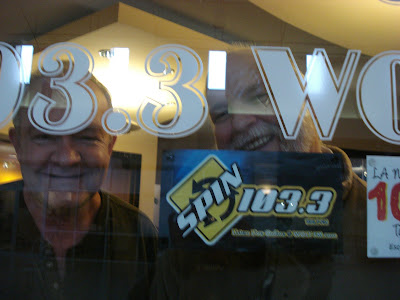At left: The Open Book, the first place I ever worked here in South Carolina, closed its doors permanently four years ago.
Mega-successful author James Patterson is on a mission to save the beleaguered, independent bookstore. Good luck, James!
As I have written here before, I looove bookstores. And so many bookstores are closing; Amazon and e-books and the net have threatened the book industry. (In fact, my photo in that last link, Carolina Book Rack? Like the Open Book, it is now long gone.)
Patterson is giving away $1 million to bookstores, in what he calls a "bookstore bailout":
The best-selling author James Patterson has started a program to give away $1 million of his personal fortune to dozens of bookstores, allowing them to invest in improvements, dole out bonuses to employees and expand literacy outreach programs.Patterson began complaining last year, that the book industry needed a bailout from the feds, just like Wall Street got a bailout. Not surprisingly, nobody paid any attention, so he took matters into his own hands:
More than 50 stores across the country will begin receiving cash grants this week, from Percy’s Burrow in Topsham, Me., to Page & Palette in Fairhope, Ala., to A Whale of a Tale in Irvine, Calif.
“I just want to get people more aware and involved in what’s going on here, which is that, with the advent of e-books, we either have a great opportunity or a great problem,” he said. “Our bookstores in America are at risk. Publishing and publishers as we’ve known them are at stake. To some extent the future of American literature is at stake.”
The current health of independent bookstores is mixed. While some have benefited from the disappearance of the Borders chain in 2011 and a shrinking Barnes & Noble, the stores have been hit especially hard with consumers switching from paper copies to e-books.
And though many communities remain loyal to their shops, and the American Booksellers Association says its membership has recently grown, the online discounters have wreaked havoc on the independent bookseller’s business model.
Last year, Mr. Patterson placed full-page ads in The New York Times Book Review and Publishers Weekly arguing that the federal government’s financial support of troubled industries like Wall Street and the automobile sector should extend to the bookstore business. Since that appears to be a pipe dream, Mr. Patterson decided to create his own bailout fund as part of his mission to promote literature, especially for children.And I love seeing the name of MALAPROPS, one of my favorite places in the world, in the New York Times. I am SO PLEASED they are getting some of the bailout money... and believe me, their carpet sorely needs replacing!
“I’m rich; I don’t need to sell more books,” Mr. Patterson said. “But I do think it’s essential for kids to read more broadly. And people just need to go into bookstores more. It’s not top of mind as much as it used to be.”
He began his project last year by getting the word to store owners that he was willing to begin writing them checks, which will range from $2,000 to $15,000, according to a spokeswoman for Mr. Patterson.
Bookstores responded with informal mini-proposals, explaining what they might do with some extra money. Bank Street Bookstore in Manhattan said it would use the funds to post and stream online video of in-store events. Hicklebee’s in San Jose, Calif., said it wanted to buy a new computer system, replacing its “small, ancient screens with green print” and perhaps bestow a bonus on its hardworking manager, Ann Seaton.
“I think it’s going to have a huge impact,” said Linda Marie Barrett, the general manager of Malaprop’s Bookstore/Cafe in Asheville, N.C., which successfully applied for a grant to replace badly worn carpeting and a damaged parquet floor. “He seems to be keenly aware that bookstores operate on small budgets.”
I am wishing all the best to James Patterson and the bookstores... and wouldn't it be nice if other rich people took this kind of initiative, to help others in their field? Millionaire musicians should be helping music stores; millionaire athletes ought to be helping small-town teams; millionaire chefs should be teaching young folks to cook, etc etc etc. Let's see some civic responsibility, rich peeps!
As it is, it makes international news whenever Bill and Melinda Gates or James Patterson or Bruce Springsteen or Dolly Parton or Oprah or someone like that, spends money altruistically and helps regular people.
That should be the norm, not the exception.




















